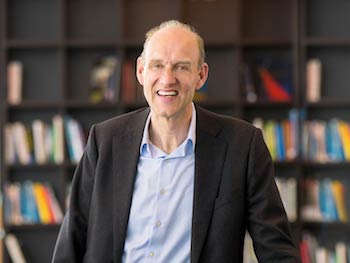
Nick Van Dam is a partner and global chief learning officer at McKinsey. He says that the vast majority of workers do not embrace lifelong learning, a generational problem: People become comfortable, particularly older people, stick with the status quo and do not look to develop themselves further. Van Dam says older people see their career as something they have already earned — they’ve already done their education and climbed the ladder, and they are not inclined to give up time and money to study again. They look at careers very differently than younger workers who are digital natives and constantly learning.
Q: Do you believe older generations can learn just as fast and easily as younger generations? What needs to change for this to happen?

Nick van Dam. Courtesy photo
Research shows variations in people who embrace “lifelong learning” based on education level and age. Overall, people with lower education levels (just high school) and/or who are age 50 or older are less interested in being continual learners. However, people with lower education levels are motivated to learn, but some reasons they don’t include that they can’t afford it financially and that they don’t have enough time for it. Another reason is that lower-educated people don’t have necessarily great memories about school: they found it challenging, some developed a fear for failing, etc.
The higher people are educated — associate degree, bachelor’s, master’s, Ph.D. — the more they take ownership for their own development. However, many people who have been for a long time at financial services companies have been surprised by the level of disruption caused by digitization, which has automated and/or changed many of their jobs, and they didn’t prepare themselves for their next role. We are the beginning of the fourth industrial revolution, which will have a huge impact on jobs, existing and new ones.
As lifespan continue to grow, retirement continues to be pushed out. For example, government retirement in the Netherlands for somebody who is 20 years old has been set at 72 — with a big disclaimer that this will likely climb. This means that people will be in the workforce for 55 or more years in a world that is changing at a faster pace than we have ever experienced.
So can we even predict the future to the degree necessary to fashion some kind of effective business school education?
The future of jobs is more about specialization, and people will only stay employable as long as they have marketable expertise/skills. In the 20th century, people attended college in their 20s and continued to learn on the job until they retired. To me, this is not a sustainable model. In the 21st century people need to go back to school at different times of their lives to build deep expertise in a new area or an area close to their first discipline. “Education permanente,” as the French say, will become the new social security!
Business schools should stay on top of the edge in providing programs which help people to transition into new jobs. The programs need to be highly personalized and flexible, e.g. students should be able to configure their own curriculum based on personal needs, but also provide a lot of opportunities to take the programs at times that are convenient for the student and fit his or her personal life/career — evenings, weekends, during weeks. But also with different modalities: classroom and online (e.g. leveraging MOOCS). Credentials will become more and more important — it’s all about building your LinkedIn profile.
How are you advising business schools to adapt to the needs of older students? What are the wrong ways to approach this population, and how common are the mistakes?
People can learn throughout their lives as long as they stay healthy. Older people learn better by connecting previous experiences and expertise with new knowledge — by connecting new knowledge to existing expertise.
Overall, just lectures and talking through PowerPoint decks is not effective. People learn the best if they collaborate with other classmates on topics and explore how the new knowledge can be applied on the job. We know from neuroscience that the best learning has an emotional touch: small nuggets; use multiple senses; shared learning with others enhances retention. Use it or lose it — it’s important that you apply what you have learned.
The pedagogy needs to be adjusted to make learning very effective for older generations. I wrote an article on this for TD magazine. Finally, if you want to change people’s behaviors — one of the expected outcomes of learning programs — you need to start with helping people to develop different mindsets. A change in behavior will follow.
DON’T MISS HOW TO ‘MANAGE’ A CHANGING ECONOMY and TO DEDUCT OR NOT? RULING MUDDIES WATERS





Questions about this article? Email us or leave a comment below.